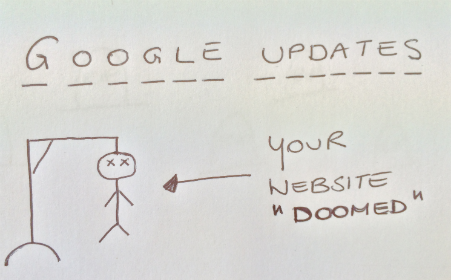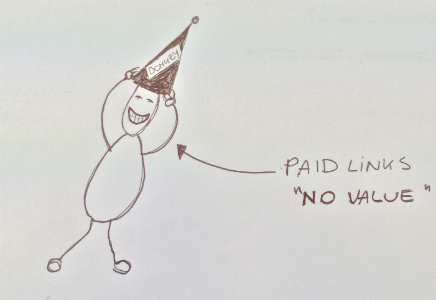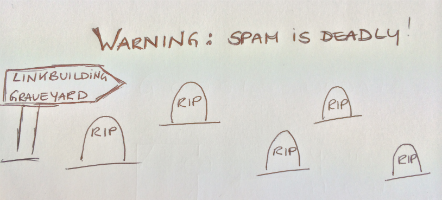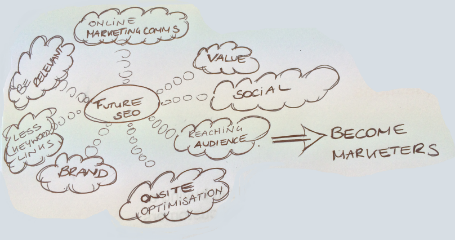Doomed By The Pursuit Of The Holy (Online) Grail
You have read the title, and now you are thinking “what is this mysterious holy grail?!” Well, since the beginning of the search engine times - businesses, webmasters and online marketers have pursued it – The Number 1 Rank! They have done this through various different Linkbuilding tactics, which over time have either died or been killed off by the almighty Google.
So, why don’t you join me in my own pursuit to find out, if being #1 could be a bad idea for your longer term digital marketing strategy. Also, I will be visiting the linkbuilding graveyard, and some of the business casualties that have been doomed along the way.

One last thing that I have to get off my chest …
“I have a dream that one day perceptions will change, and businesses will stop thinking that digital marketing is all about rankings. I have a dream that digital marketers will finally understand that reaching target audiences and driving the right traffic to a website is more important. Yes, I have a dream today!” …
Casualties Of Wanting To Be #1
Stop dreaming and start making changes. These very wise words (which are my own, I believe) might be coming a little late for the list of high profile brands that got their fingers (or rankings) burnt, because the only thing they could see was that ominous #1 rank.

Over the years, I have learnt that the best way to teach people is to show them when things went really wrong. Why wait to learn from your own mistakes – if you can learn from the mistakes of others? So, here we go:
- Interflora – well this must be the best known Google casualty out there. Not only did they lose 95% of their rankings for generic keywords, but Google went that little bit further and penalised them for branded terms as well. But why? What did they do to deserve such a punishment? – PAID LINKS
- Regional Newspapers aka the Scotsman saga – Hand in hand with the Interflora penalisation came a penalty for some 600 regional newspapers. They were stripped of their Page Rank – some seeing it fall from PR 7 to 0 – Ouch! – PAID LINKS
- BMW – You would think such a global brand would know better? However, their penalisation came for a clever little trick – duping Google into believing that their pages were full of amazing content – well it didn’t last too long. They apologised and Google went soft on them. – GATEWAY PAGES
- Forbes – They were giving away links like there was no tomorrow – Google didn’t really like that – a lot of sad faces once those links got switched off. – PAID LINKS
- RapGenius – the latest causality – getting links for a favour – a big no no for Google. – INCENTIVISED LINKS
So, throughout the examples above, the common factor is “links”. I can hear you crying out “So linkbuilding is bad - Panic!” – well it might be one of the factors in the downfall of these brands. However, it is not the root cause. The real cause was that they wanted to take a short-cut to position 1, and did not think about the longer term implications. When setting out a business strategy, it is important to think ahead – think what effect today’s actions and decisions could have down the line to the business and/or brand. “Really?” I hear you saying! “But you said in your ‘why marketing strategies fail’ post – that short term strategies are the way forward”. Firstly, “well done for reading my other blog post (proud of you)!” What I really said was to keep it fresh, but you should have some brand values, and keep your strategy aligned with how you would like your audience, customers and other stakeholders to perceive you! Surely you don’t want to look like a “cheat”.
The wider question here is – did these brands really do something wrong? Did they really break the online code of practice (is there one?)? We could argue that going back into Google's history some of the tactics they used were totally fine – until – yes ‘UNTIL’ Google changed their mind.
The Linkbuilding Graveyard

You might be expecting a long list of tactics; well I've really got them down to 2 major strategies that Google chose to dislike over time. In the early days of Google and Ranking – Page Rank was a very important factor. The higher the Page Rank the better – an easy way of getting your PR up in the good old days was to gain links, and it did not really matter where those links came from. So, as the online market became more competitive and more sophisticated the following tactics promised a quick win for a lot of online businesses (and digital marketers):
- Buying Links: Well the term really says it all. Instead of ‘earning’ a link, businesses and marketers went out and purchased them. The most popular tactic here was to give out paid advertorials.
- Link Farming: It sounds almost like something you’d do on a sunny Sunday afternoon, but no, this isn’t the type of farming Google likes. If you looked link farming up, you will get an explanation of a network of websites having an agreement of giving each other links. For me it is more than that. Some marketers started large and ‘artificial’ blogger networks, rehashing content and giving links away to boost their marketing efforts and results. Article directories (and many other general online directories) have grown into link farms as well, where people dip in and out growing their links in disguise of (apparently) relevant content.
Although some of the tactics seemed to be genuine tactics back then, Google didn’t want to see them used any longer, so created their infamous “algorithm updates” to ensure Google searchers are presented with value and not spam.
How Valuable is a #1 Rank Nowadays?
But my real question is “how valuable is a #1 rank nowadays”. Could we argue that if you are now pursuing a #1 rank you will be using tactics that might, a few years from now, get banned by Google (they do like to change their mind)? So, by trying to get to that so desired spot in Google – you might be working towards your own downfall?
Plus, I don’t really believe that position 1 in Google is worth the same as it was a few years ago. With universal search results pushing natural listings down, your natural add could be well below that dreaded fold! Additionally, Google has been working hard to make PPC Ads appear almost the same as a Natural Search Result. This is not just a coincidence – it’s to gain more clicks! Here's a little example: let’s say we really would like to rank number 1 for snowboarding (Sochi rubbed off on me and awakened the snow-loving Austrian in me). This is what people who search for ‘Snowboarding’ see in Google:

Emmmm what’s the number 1 here then (excluding the likes of Wikipedia, the annoyance to any SEO out there)?
So, am I saying you should give up on SEO? No – just use it in a valuable way!
A Look Into The Future Of Search Results – Creating Value (WHAAAT?)
Value is the key! The future of search as I see it is to dump mass marketing i.e. directories, article marketing, linkbuilding per se, and switch to targeted marketing approaches. I am a marketer, mass marketing tactics seem attractive, and especially in the online world with a simply placed link you will be able to reach a lot of people. However, are those people really the ones that are interested in your service, brand, information or products? I would say the majority would bounce off your site.

My opinion is building value around an online brand, and promoting its unique selling point (USP) to the identified audiences will ultimately be the way forward. The better a brand is known, the more positive information there is about a brand, the more it ticks all the points that their target market / audience wants, the more successful they will be. It’s quite a simple theory, right?
Plus, the fact that Google announced that they have been running some ominous tests could easily mean that Search Marketing might be changing forever. Google is trying to get to a point where they will be able to rank websites without relying on backlinks.
So, going back to my snowboarding example, if this scenario becomes reality (believe me it will at some point, if they are investing in running these tests) what will your random ‘Snowboarding’ link in an article somewhere on the web be of value to your brand? Great, if your brand is called ‘Snowboarding’, not so great if it is not!
I am a big advocate of onsite marketing – make sure you have an amazing website that caters for your audience, has all the right keywords included (which are RELEVANT to your brand) in the meta and onsite copy, with content that actually is relevant and engages your audience. If you have this – you are one step closer to success. Then run your offsite marketing (SEO, PPC, etc) to take your amazing onsite story directly to your audience. Tell them about your brand and what it does!
Of course this means online marketing will not be as easy as getting a simple link any longer. It means that linkbuilders will have to grow up and become online marketing communications managers – creating communication strategies. You are a linkbuilder and thinking “what the hell – packing my bags now!” Don’t be silly – you were waiting for this moment to come – be creative and create value for your clients and their target audiences. Become the online hero you were supposed to be – A MARKETER!
Well, I believe that’s all from me … I shall leave you with the wise words of Albert Einstein “Strive not to be a success, but rather to be of value”…
Follow my contributions to the blog to find out more about digital marketing, or sign up to the ThoughtShift Guest List, our monthly email, to keep up-to-date on all our blogposts, guides and events.
